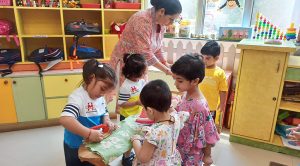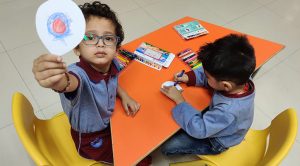“The most important thing that parents can teach their children is how to get along without them.” Frank Clark.
Parenting will never be overwhelming if we, despite having the sense of direction, are ready to manoeuvre our ride based on the likes and dislikes of our children and match their pace. Flexibility is the name of the game; however, we need to be careful about adopting a moderate approach to maintain a happy zone.
We, as educators and parents, need to understand the worth of happiness before enabling and expecting our children to understand the same. It begins with us realizing the importance of living in the moment and not stressing out about what’s going to happen next. Happiness is quintessential to positive thinking and if we have succeeded in nurturing our children into becoming positive thinkers, half the battle is won!
When you are looking for a school for your precious ones, it is not the facilities that should be leading your list of priorities, but instead, a school that has happiness ubiquitously spread all over its campus. I say so because a happy school is a place where teachers are caring and thoughtful with an endearing disposition towards the students, while setting challenging goals. These goals are based on a well-designed curriculum and a balanced bifurcation of the syllabus with relevant co-scholastic activities having drawn their inspiration from the best practices all over the globe to support it. Facilitators of a happy school are lenient with their expectations; nonetheless, at the same time, they are firm enough with their students pushing them towards their full potential to achieve the happy goals within the given deadlines.
I say so because a happy school is a place where teachers are caring and thoughtful with an endearing disposition towards the students, while setting challenging goals. These goals are based on a well-designed curriculum and a balanced bifurcation of the syllabus with relevant co-scholastic activities having drawn their inspiration from the best practices all over the globe to support it. Facilitators of a happy school are lenient with their expectations; nonetheless, at the same time, they are firm enough with their students pushing them towards their full potential to achieve the happy goals within the given deadlines.
Let me take you back to the initial years of a child that are fondly called the foundation years; I want to do so, because it is in this phase the development of the fine and gross motor skills, socio emotional quotient, perception of dimensions, classification and the fundamentals of life skills form their base.
It is believed that pedagogies based on hands-on and play-based learning with much of kinaesthetic involved while exploring, works wonders with children at the Early Years level. The interesting fact is that it is the same approach that engages students of Primary and Middle-schools too while learning! Working towards increasing both the depth and duration of concentration of the students, providing platforms for language acquisition and development, creating opportunities for grace and courtesy development in tandem with the rich culture and traditions prevalent -not just in our home country, but also of the other countries around, we need to train them to become thinkers who can innovate and create. It is vital for the wholesome growth of the students; to be able to start thinking at an early age because we know this that humans are born with curiosity. Therefore, another fact that’s pivotal to children’s physical and mental growth is the accuracy of our own expectations. This doesn’t just enrich the environment in which the child is growing, but also makes every minute a smiling one through meeting realistic goals without recurring disappointing moments.
Working towards increasing both the depth and duration of concentration of the students, providing platforms for language acquisition and development, creating opportunities for grace and courtesy development in tandem with the rich culture and traditions prevalent -not just in our home country, but also of the other countries around, we need to train them to become thinkers who can innovate and create. It is vital for the wholesome growth of the students; to be able to start thinking at an early age because we know this that humans are born with curiosity. Therefore, another fact that’s pivotal to children’s physical and mental growth is the accuracy of our own expectations. This doesn’t just enrich the environment in which the child is growing, but also makes every minute a smiling one through meeting realistic goals without recurring disappointing moments.
Another vital factor of parenting is to be a good and a patient listener to your child that will effortlessly make you her/his good friend and confidante creating that beautiful relationship between you both that will gift you blissful moments!

Here are 3 magical wands for a happy childhood and schooling:* the relationships built during this phase* the habits inculcated* the values instilled
These are the three fundamentals that shape the structure and function of your child’s brain.
We must first of all build our own relationship on genuine affection and empathy without fear of negative vibes, so that they can base all their relationships on similar grounds.
We need to teach our children the ways to love, to bond, to deal with their emotions so that at the culmination of this learning, they are prepared to understand the difference between healthy and unhealthy relationships. They should have the maturity to relish the worthy relationships and segregate themselves from the unworthy ones avoiding lingering unpleasantness and agony.
Always remember, there is nothing more important during the years of growth and development than happiness that’s rooted in ethics and values. So let’s together create an arena that is a gallery of happy moments for our children!
At this point of my interaction with you, I want to say, “Be extremely good as parents that children can’t ignore your advices!”
Author: Ms Seema Anis, Principal-MRIS 21 C, Faridabad.





